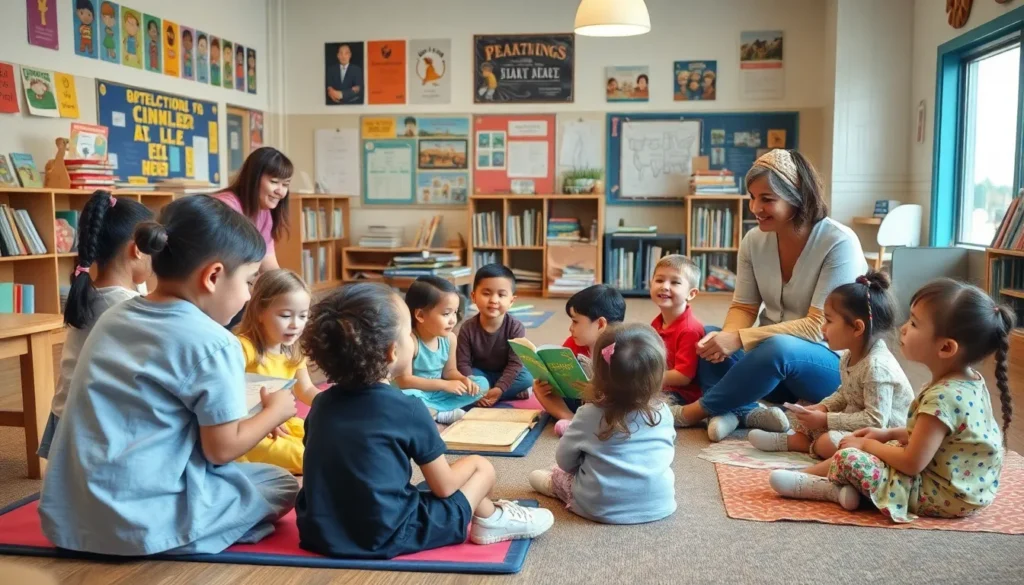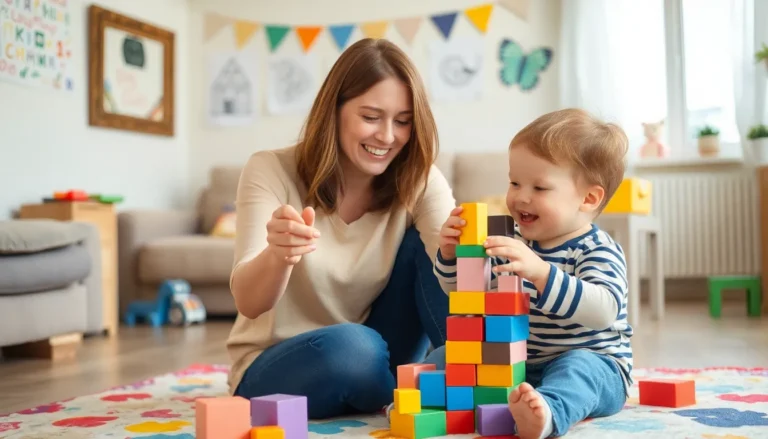Table of Contents
ToggleIn a world where emojis often replace words and texting has become an art form, nurturing literacy skills might seem like a daunting task. But fear not! Engaging literacy activities can turn reading and writing into a thrilling adventure rather than a chore. Imagine a realm where kids discover the joy of storytelling, and adults finally remember what a semicolon is—it’s like a grammar party no one wants to miss!
Importance Of Literacy Activities
Engaging in literacy activities plays a crucial role in developing essential reading and writing skills. These activities foster a love for language, which motivates both children and adults to delve deeper into texts. Exploring different genres encourages diverse vocabulary and enhances comprehension.
Practicing literacy in interactive ways can create a positive association with learning. Storytelling sessions stimulate imagination and improve narrative skills, while group discussions enhance critical thinking. Incorporating games alongside traditional methods makes the learning experience dynamic and enjoyable.
Beneficial outcomes can arise from consistent participation in literacy programs. Research indicates that children who engage in regular reading activities perform better academically. Adults, too, find that recommitting to literacy skills can boost career opportunities and personal growth.
Aligning literacy practices with everyday life strengthens connections with various media. Activities like journaling or blogging allow personal expression and practical application of writing skills. Participating in community literacy events can further cultivate a supportive environment for shared learning.
Prioritizing literacy activities contributes significantly to individual growth and community engagement. It nurtures creativity and drives continuous learning, making it essential for all age groups. Investing time in these activities not only enhances communication abilities but also enriches one’s understanding of the world.
Types Of Literacy Activities

Literacy activities encompass diverse methods to enhance reading, writing, speaking, and listening skills. Engaging in various activities can create a rich learning environment.
Reading Activities
Reading activities foster comprehension and vocabulary development. Book clubs provide opportunities for discussions, while guided reading sessions address specific skills. Choosing diverse genres exposes learners to different styles. Interactive reading, such as shared stories, encourages participation and critical thinking. Utilizing digital resources can enhance engagement through multimedia elements. Consistent practice in these areas leads to improved literacy skills over time.
Writing Activities
Writing activities strengthen communication and self-expression. Journaling offers individuals a chance to reflect on their thoughts and experiences. Crafting stories allows learners to explore creativity and narrative structure. Additionally, incorporating blogging encourages sharing ideas with broader audiences. Group writing projects promote collaboration and peer feedback. Developing these skills cultivates confidence in written expression.
Speaking Activities
Speaking activities enhance verbal communication and public speaking skills. Participating in debates sharpens critical thinking and articulation. Storytelling sessions encourage individuals to share narratives and connect with others. Engaging in presentations builds confidence and prepares learners for diverse contexts. Group discussions promote active listening and respectful dialogue. These activities ensure learners can communicate effectively in various situations.
Listening Activities
Listening activities improve comprehension and attentiveness. Engaging in podcasts introduces diverse topics and enhances critical listening skills. Following directions during activities helps reinforce active listening. Group discussions allow individuals to practice summarizing and responding to ideas. Incorporating audiovisual materials can boost engagement and understanding. Regular practice in these areas significantly impacts overall literacy proficiency.
Benefits Of Engaging In Literacy Activities
Engaging in literacy activities offers multiple benefits that enhance overall development. Participants can expect significant improvements in cognitive skills and social interaction.
Cognitive Development
Cognitive growth occurs through literacy activities. These activities challenge the brain, leading to enhanced critical thinking, reasoning, and problem-solving abilities. Engaging with various texts stimulates curiosity and encourages deeper comprehension. When individuals participate in storytelling or reading diverse genres, they widen their vocabulary significantly. Increased vocabulary fosters better expression and enhances writing skills. Additionally, activities like journaling allow for reflection, which promotes self-awareness. Consistent engagement leads to improved academic performance in children. Adults also find that enhanced literacy skills provide a competitive edge in the workforce.
Social Interaction
Social interaction flourishes within literacy activities. Group discussions foster collaboration, encouraging participants to share insights and perspectives. Debates and peer feedback create a supportive environment, allowing individuals to express ideas freely. Engaging with others over literature enhances communicative competence. This exchange of thoughts nurtures relationships and reinforces community ties. Many participants enjoy attending book clubs or community events that promote literacy, further strengthening social networks. Adults often discover new friendships through shared literary interests. Children build confidence when discussing stories, which benefits their social skills and emotional growth.
Implementing Literacy Activities At Home
Implementing literacy activities at home fosters crucial reading and writing skills. Parents can create a vibrant learning environment by incorporating storytelling sessions into daily routines. Storytime encourages imagination and helps children connect emotionally with narratives.
Utilizing a variety of genres enhances vocabulary and sparks interest in reading. Choose books from diverse cultures and themes, broadening the understanding of language and context. Establishing a family book club cultivates discussions, improving comprehension and critical thinking skills.
Involving family members in writing activities strengthens communication. Journaling provides an outlet for personal expression, while collaborative projects promote teamwork and creativity. Sharing stories allows everyone to appreciate different perspectives and storytelling techniques.
Daily conversations contribute to verbal skills. Engaging in debates or casual discussions encourages articulate expression, helping children gain confidence. Listening to podcasts or audiobooks enhances comprehension and introduces new vocabulary, making learning enjoyable.
Encouragement in literacy activities leads to significant cognitive development. Children exhibit improved problem-solving and reasoning abilities through consistent practice. Adults also benefit, as enhanced communication skills translate to better opportunities in the workforce.
Community resources further support literacy growth. Utilizing local libraries for events encourages social interaction and learning. Attending workshops or group discussions reinforces collaborative skills and builds supportive networks.
Encouraging literacy activities at home nurtures a love for language. Children thrive in environments that celebrate reading, writing, speaking, and listening. Prioritizing these activities transforms them into enjoyable experiences, benefiting individuals and families alike.
Engaging in literacy activities creates a vibrant path for individuals of all ages to develop essential reading and writing skills. By fostering a love for language through interactive and enjoyable experiences, participants not only enhance their cognitive abilities but also strengthen social connections.
Incorporating these activities into daily life promotes personal expression and practical application of skills. Families can create supportive environments that encourage creativity and critical thinking. As communities embrace literacy initiatives, they empower individuals to achieve academic and professional success, making literacy an integral part of lifelong learning.







